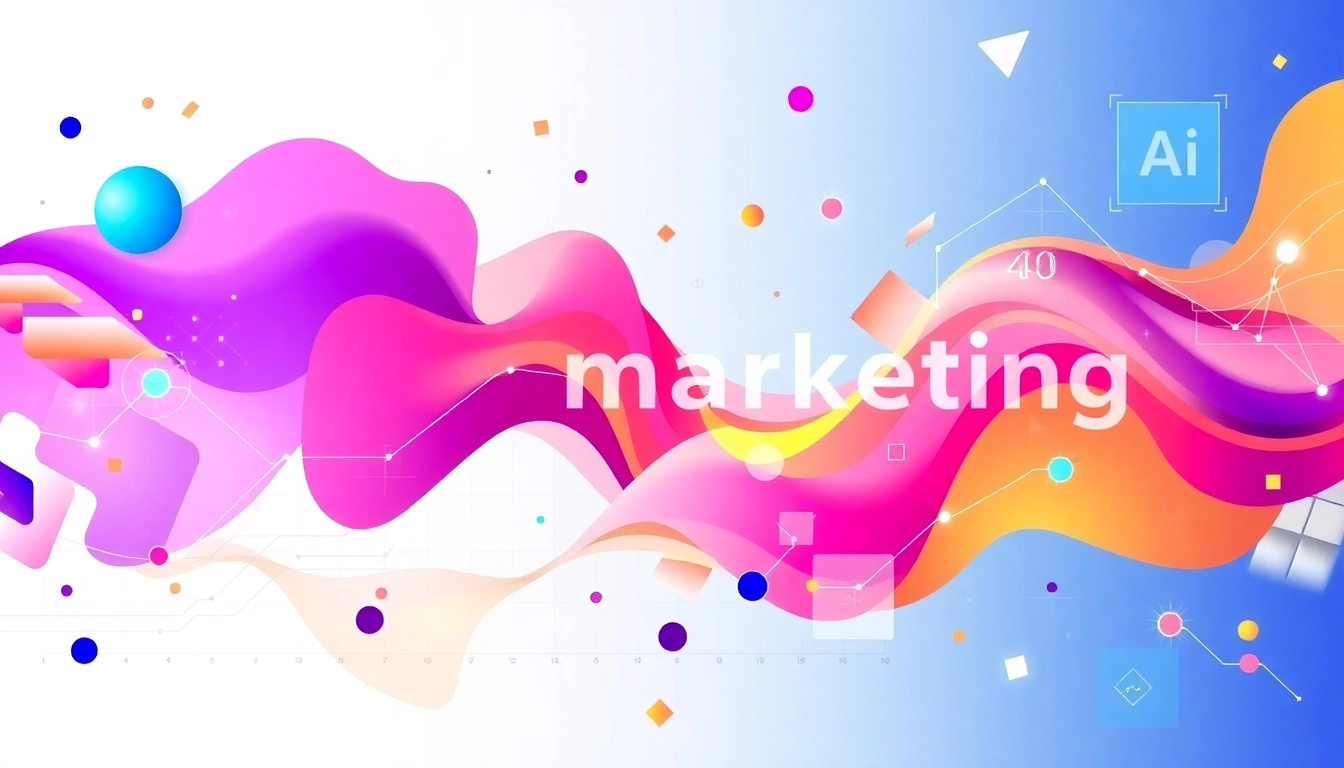Understanding AI Marketing Tools
In today’s rapidly evolving digital landscape, the importance of leveraging technology in marketing cannot be overstated. AI marketing tools have emerged as pivotal assets for businesses aiming to innovate and enhance their marketing strategies. These advanced solutions harness the power of artificial intelligence to streamline processes, improve decision-making, and deliver personalized customer experiences. In this comprehensive guide, we will delve into the world of AI marketing tools, exploring their benefits, key features, and the tools that are leading the way in this transformative industry.
What Are AI Marketing Tools?
AI marketing tools can be defined as software applications or platforms that utilize artificial intelligence algorithms and machine learning technologies to automate marketing tasks, analyze data trends, and optimize campaigns. From customer segmentation to campaign analysis, these tools enable marketers to gain insights that were previously difficult to obtain. They operate on vast amounts of data, adapting and learning from it to enhance their performance over time.
Benefits of Using AI Marketing Tools
Employing AI-powered tools in marketing strategies offers numerous advantages:
- Increased Efficiency: Automation of repetitive tasks saves time and allows marketers to focus on strategic initiatives.
- Enhanced Customer Insights: AI tools can analyze vast datasets to extract actionable insights, enabling more effective targeting.
- Personalization: AI allows for more tailored marketing strategies by analyzing user behavior and preferences.
- Scalability: AI tools can handle a growing amount of data and tasks, making them suitable for businesses of all sizes.
- Cost-Effectiveness: By automating processes, companies can reduce overhead costs and allocate resources more effectively.
Common Features of Top AI Marketing Tools
While specific features can vary among AI marketing tools, there are several common functionalities that users can generally expect:
- Data Analytics: Tools that provide insights into campaign performance, customer behavior, and market trends.
- Predictive Analytics: Features that utilize historical data to predict future outcomes for better strategic planning.
- Content Generation: AI tools that can create high-quality content for marketing campaigns, including copy for ads, social media posts, and blog articles.
- Chatbots: Automated systems that can interact with customers in real-time, providing instant support and responses.
- Customer Relationship Management (CRM): Integrated systems that help businesses manage interactions with current and potential customers.
Popular AI Marketing Tools for Businesses
An Overview of Leading AI Tools
Several AI marketing tools are making waves across the industry, each offering unique features to cater to various business needs. Below is an overview of some of the most notable tools available:
- HubSpot: Known for its robust CRM, it uses AI to enhance lead scoring, email marketing, and customer follow-ups.
- Jasper AI: A content generation tool that assists marketers in creating high-quality copy efficiently.
- Surfer SEO: This tool optimizes content for search engines using AI-driven recommendations based on top-performing content.
- Canva AI: Helps marketers design stunning visuals quickly, integrating design and AI seamlessly.
- FeedHive: A social media management tool that recycles content and optimizes posting schedules.
Comparing Free vs. Paid AI Marketing Tools
When it comes to choosing AI marketing tools, businesses often face the dilemma of opting for free tools versus investing in paid solutions. Free AI marketing tools can provide decent functionalities and are suitable for startups and small businesses with limited budgets. However, they might lack advanced features, customer support, and the scalability that paid tools offer. Paid AI marketing tools, though requiring a financial commitment, typically provide more sophisticated features, superior performance, and better support, which can be crucial for larger businesses.
Case Studies: Successful Implementations
Understanding real-world applications of AI marketing tools can provide insights into their effectiveness. Consider the following case studies:
- Case Study 1: HubSpot for Lead Generation – A mid-sized eCommerce business integrated HubSpot’s AI tools to enhance their lead generation process. The AI-powered CRM automated follow-ups and segmentation, resulting in a 30% increase in conversion rates within three months.
- Case Study 2: Jasper AI for Content Creation – A digital marketing agency implemented Jasper AI to generate blog content. This reduced their content creation time by 50%, allowing them to focus on strategy and client engagement.
Choosing the Right AI Marketing Tool for Your Needs
Key Considerations When Selecting Tools
Choosing the right AI marketing tool involves careful consideration of several factors:
- Your Business Size: Larger enterprises may need more robust, scalable solutions, while small businesses might do well with simpler, cost-effective tools.
- Specific Goals: Identify what you need the tool for—lead generation, content creation, analytics, etc.—and choose accordingly.
- Ease of Use: Ensure that the tool is user-friendly and requires minimal training for your team.
- Integration: Check if the tool integrates seamlessly with your existing systems and processes.
Integrating AI Tools into Current Marketing Strategies
Once you’ve selected the appropriate AI marketing tools, the next step is integration. This process involves:
- Defining Objectives: Set clear objectives to guide the implementation process and measure success.
- Training Team Members: Ensure your team is adequately trained to use the new tools effectively.
- Testing: Begin with a pilot program to assess the tool’s effectiveness and make necessary adjustments before full-scale implementation.
Measuring ROI: Success Metrics for AI Marketing
To justify the investment in AI marketing tools, it is imperative to measure the return on investment (ROI). Key performance indicators (KPIs) to track include:
- Conversion Rate: Measure the rate at which leads convert into paying customers.
- Customer Engagement: Analyze interactions with your brand through various channels.
- Cost Per Acquisition (CPA): Understand how much it costs to gain a customer using AI tools.
- Customer Lifetime Value (CLV): Assess the long-term value of customers acquired through AI-driven marketing.
Future Trends in AI Marketing Tools
Emerging Technologies Impacting AI Marketing
The landscape for AI marketing tools is continuously evolving. Emerging technologies that are shaping the future include:
- Natural Language Processing (NLP): Enhancements in NLP will improve content generation and customer interactions.
- Data Privacy and Security: As regulations tighten, AI tools will evolve to ensure greater data security while optimizing operations.
The Role of Personalization in AI Marketing
Personalization remains a critical aspect of marketing, and AI tools are becoming increasingly sophisticated in delivering tailored experiences. Utilizing customer data, AI can segment audiences based on behavior, preferences, and past interactions to craft personalized content and promotions.
Long-term Predictions for AI in Marketing
Looking ahead, AI is expected to become even more integral to marketing strategies. Predictive analytics will play a significant role in forecasting market trends and customer behavior. Furthermore, as AI continues to learn and adapt, it will increasingly drive business strategies, leading to a more data-driven approach to marketing.
Conclusion: Embracing AI in Your Marketing Strategy
Simplifying Workflows Through AI
AI marketing tools are streamlining workflows, allowing marketers to focus on strategy and creativity rather than mundane tasks. By embracing these tools, businesses can accelerate their marketing processes, drive efficiencies, and better engage with their customers.
Building a Data-Driven Marketing Approach
The integration of AI in marketing also fosters a culture of data-driven decision-making. By continuously analyzing data generated from AI tools, marketers can refine their strategies, ensuring that they remain agile and responsive to changing market conditions.
Staying Ahead in the Competitive Landscape
As more businesses adopt AI marketing tools, staying ahead of the curve becomes essential. Those who leverage technology to enhance their marketing strategies will significantly improve their competitive advantage, fostering innovation and long-term growth.



